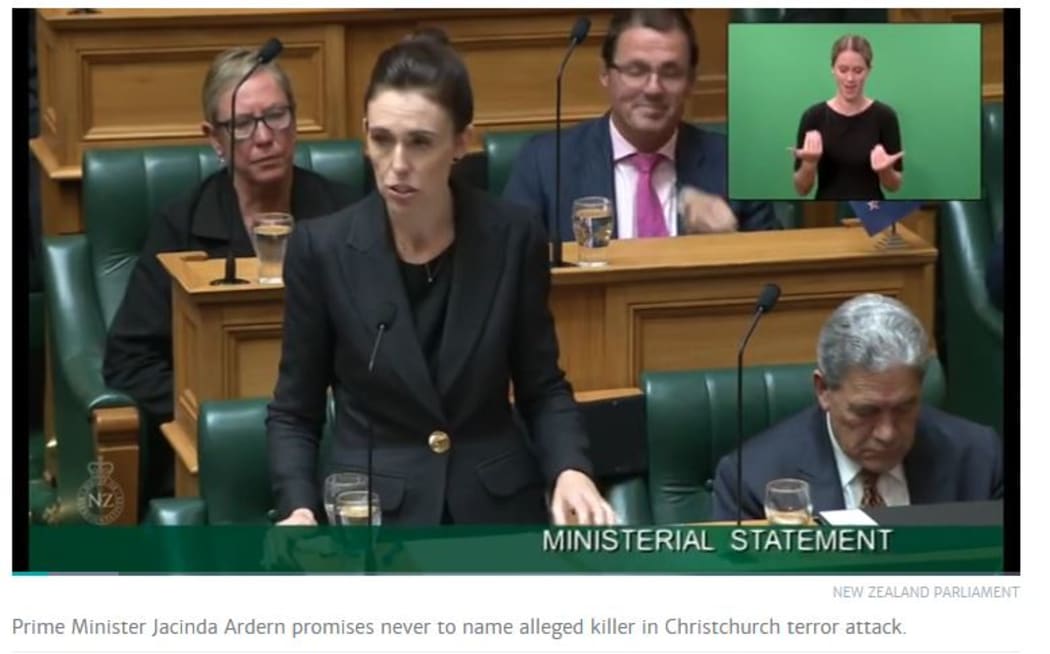
Photo: Parliament TV/Screenshot
"He sought many things from his act of terror, but one is notoriety. And that is why you will never hear me mention his name. He is a terrorist. He is a criminal. He is an extremist. But he will, when I speak, be nameless.
"And to others, I implore you: Speak the names of the lives who were lost, rather than the name of the man who took them."
When Prime Minister Jacinda Ardern spoke those words in Parliament on Tuesday she articulated what many people have been feeling. And there's evidence that the media following her example could make a difference when it comes to limiting such horrific attacks in the future.
In 2017, 149 academics wrote an open letter to the US media calling on them to stop publishing the names and photos of mass murderers.
"We strongly urge you to take a principled stand in your future coverage of mass killers that could
potentially save lives," they wrote.
"Don’t name the perpetrator; don’t use photos or likenesses of the perpetrator; stop using the names, photos, or likenesses of past perpetrators."
Glynn Greensmith, a journalism lecturer at Curtin University, Perth, was a signatory of the letter and told Mediawatch, this week, that there was clear and compelling evidence that mass shooters are influenced by previous mass shootings.
Nine out of ten mass killers, he said, tend to know everything about the shooters who came before them and are "seeking to write their own script - get their own name out there".
"Taking away his image can be powerful, taking away his name can be powerful, taking away his version of motivation and the media's version of motivation, which is to say let's find out everything we can about this person and tell you, can be very, very powerful and could stop this crime."
He said the experts aren't calling for a blanket ban of the killers names - just a much more carefully considered approach.
"The evidence tells me that the actual use of the name itself in certain circumstances isn't necessarily problematic. And in procedural circumstances such as 'such and such is in court' that it's not as bad. What I'm talking about is the glorification by proxy."
In 1966, a mass shooting in Texas saw an unprecedented amount of media coverage.
"It was the first time the news generally started covering it a certain way, where they said: 'Who is this person? How did they commit this crime? Let's look at how they did it by looking at this person."
Greensmith said that before 1966 mass shootings had been fairly infrequent, but jumped to about 15 in following years and has continued to increase since.
In 2017, Mediawatch spoke to behavioural economist Michael Jetter about his research showing that media coverage of terrorist attacks could significantly increase the number of future attacks.
Dr Jetter has since carried carried out research on the effects of media coverage of mass shootings and come up with similar results.
By comparing mass shootings that occurred on the day of another major news event - such as a natural disaster - with those that occur on a slow news day Dr Jetter found that "half mass shootings were explainable by news coverage alone".
The group No Notoriety has published published guidelines that say the names of perpetrators should not be used in headlines, and should be limited to one mention per story. It says the names of victims should be elevated and it cautions journalists to recognise that infamy serves as a motivating factor in these horrific crimes.
RNZ chief executive Paul Thompson said the organisation would continue to use the name of the accused gunman in the Christchurch case, but only when it was material to the story.
"We certainly don't think it would be appropriate to have a blanket ban on using the accused's name, but I do think we'll use it judiciously and certainly be careful that we're not repeating it ad nauseam."

